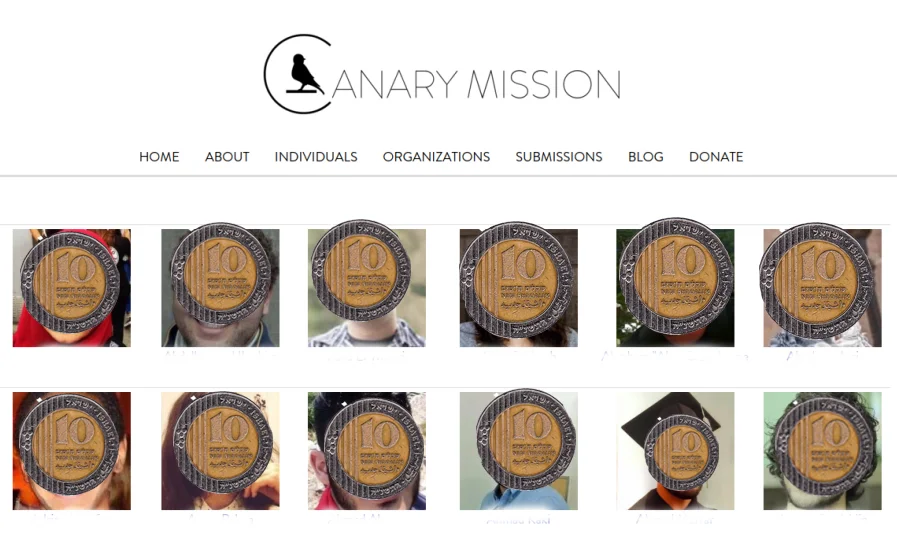Smear and Shekels
By Gilad Atzmon
Haaretz reveals today that Canary Mission a Hasbara defamation outlet that was established to “spread fear among undergraduate activists, posting more than a thousand political dossiers on student supporters of Palestinian rights,” is funded by one of the largest Jewish charities in the U.S.
According to Haaretz; the Forward, an American Jewish outlet, “has definitively identified a major donor to Canary Mission. It is a foundation controlled by the Jewish Community Federation of San Francisco, a major Jewish charity with an annual budget of over $100 million.” We could have guessed the funding was from such an organisation. We somehow knew that it wasn’t the Iranian government or Hamas who sent shekels to the Zionist smear factory. Haaretz continues, “for three years, a website called Canary Mission has spread fear among undergraduate activists, posting more than a thousand political dossiers on student supporters of Palestinian rights. The dossiers are meant to harm students’ job prospects, and have been used in interrogations by Israeli security officials.”
Canary Mission is indeed a nasty operation and far from unique. We have seen similar efforts within the Jewish institutional universe for some time. It might be reasonable to opine that smear has become a new Jewish industry. Consistent with the rules of economics, many new Jewish bodies have entered the profitable business, and these outlets have competed mercilessly with each other for donations and funds.
This is precisely a variation on the battle we have seen in Britain in the last few years. Almost every British Jewish institution joined the ‘Corbyn defamation’ contest, competing over who could toss the most dirt on the Labour party and its leader. The outcome was magnificent. Last week at Labour’s annual conference, the party unanimously expressed its firm opposition to Israel and took the Palestinian’s side.
Badmouthing is not really a ‘Zionist symptom.’ Unfortunately, it is a Jewish political obsession. In between its fund raisers, it seems that Jewish Voice for Peace (JVP) invests a lot of energy in smearing some of the more dedicated truth tellers. Mondoweiss, another Jewish outlet, practices this game as well.
I, myself, have been subjected to hundreds of such smear campaigns by so called ‘anti’ Zionist Jews who were desperate to stop the circulation of my work on Jewish ID politics. But these frantic efforts only served to support my thesis that the issues to do with Israel and Palestine extend far beyond the Zionist/anti debate. We had better dig into the meaning of Jewishness and its contemporary political implications.
Once again the question is, why do self-identified Jewish activists use these ugly tactics? Why do they insist upon smearing and terrorising instead of engaging in a proper scholarly and/or political debate?
Choseness is one possible answer. People who are convinced of their own exceptional nature often lack an understanding of the ‘other.’ This deficiency may well interfere with the ability to evolve a code of universal ethics.
The other answer may have something to do with the battle for funds. As we learned from Haaretz, the Canary Mission is funded by one of the richest Jewish American funds. Badmouthing has value. ‘You defame, we send money.’ Unfortunately this holds for Zionists and ‘anti’ alike.
Crucially, in this battle, Jews often oppose each other. Haaretz writes that the Canary Mission “has been controversial since it appeared in mid-2015, drawing comparisons to a McCarthyite blacklist.” And it seems that some Zionist Jews eventually gathered that the Canary smear factory gives Jews a bad name.
Tilly Shames, who runs the campus Hillel at the University of Michigan, Ann Arbor, told the Forward that “the tactics of the organisation are troubling, both from a moral standpoint, but have also proven to be ineffective and counterproductive,”
Shames said that Canary Mission’s publication of dossiers on students on her campus had led to greater support for the targeted students and their beliefs, and had spread mistrust of pro-Israel students, who were suspected of spying for Canary Mission.
This dynamic can be explained. My study of Jewish controlled opposition postulates that self-identified Jewish activists always attempt to dominate both poles of any debate that is relevant to Jewish interests. Once it was accepted that Palestine was becoming a ‘Jewish problem,’ a number of Jewish bodies became increasingly involved in steering the Palestinian solidarity movement. We then saw that they diluted the call for the Palestinian Right of Return and replaced it with watery notions that, de facto, legitimise Israel.
When it was evident that the Neocon school was, in practice, a Ziocon war machine, we saw bodies on the Jewish Left steer the anti-war call. When some British Jews realised that the Jewish campaign against Corbyn might backfire, they were astonishingly quick to form Jews for Jeremy that rapidly evolved into Jewish Voice for Labour (JVL). The battle over the next British PM became an internal Jewish debate. The rule is simple: every public dispute that is somehow relevant to Jewish interests will quickly become an exclusive internal Jewish debate.
Hillel activists see that Canary Mission is starting to backfire. Together with Forward and Haaretz, they have quickly positioned themselves at the forefront of the opposition.
